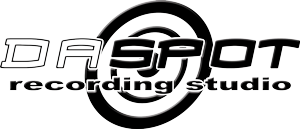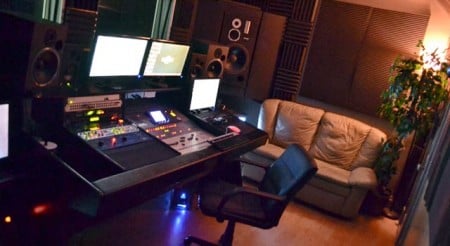Mentor News
When Recording Connection mentor
Kelly Jones is interviewing prospective students, he doesn’t mince words about what to expect.
“I try to kind of give it to them straight,” he says.
“I want to let them know right upfront that it’s not going to be fun and games…If they don’t, they are going to get a rude awakening when they first come into the program…So, I want to let them know, and I don’t mind telling them, ‘Look, if you are in here just for the dream and you think you are just going to be star right off the top, then you might want to rethink that, maybe to think of another hobby. Try bowling or something, because it takes a while.’”

Kelly ought to know. As co-founder of
Da Spot Recording Studio in Richmond, Virginia, he’s spent many years forging a solid career as a producer/engineer while helping to establish Da Spot as one of the premier urban recording studios in Richmond, Virginia, servicing such clients as
Ashanti, Rick Ross, Audra the Rapper, Tyrese and Def Jam Records, among others. For Kelly, the secret to success is not really a secret at all. It’s just working hard and putting out good music.
“We’ve done quite a few people over years that have some major names,” says Kelly,
“but there was no particular artist that gave us a break. It was just steady, constant, doing good work. It was nothing more than that. ‘Hey, these guys are good, go see them.’ That’s it.”
To earn that kind of reputation, sometimes it requires thinking outside the box, sometimes quite literally—things you wouldn’t learn in textbooks or in trade schools. Kelly recalls one story in particular:
“Early on, when I was first learning to record, I’m at another studio and the engineer is there—this studio was just amazing. Like every mic you can think of on the planet, you know what I mean? They had it…We’re working on something, and the guy, he’s like, ‘Man, I just can’t get it to sound like I want it to sound.’ He’s like, ‘Yo, Kells, go in the back and get me a cardboard box out of the trash.’ I’m like, ‘Okay.’ I don’t know, I’m just learning the process.

Control Room in Da Spot Recording Studio
Kelly says part of the learning process is also learning from others in the studio.
“The funny thing is that I share mostly with my students more of my mistakes than any of my successes, because that’s how I learned. I learned from my mistakes,” he says.
“I’ll give you one more [story]…I’m in a session, and I had this really dynamic singer in there like the Patti LaBelle type… I’m using this mic, and she goes from ‘La’ to ‘RAAH!’ She’s clipping at that point, and I’m like, ‘Okay, what the heck do I do?’ So I’m riding the fader, it’s not working. Nothing is working….So after the session, I kind of hide it a little bit with some delays or reverbs or whatever. But I know it’s there…At that point, I’m like, ‘Why couldn’t I figure this out?’ So I called the guy [who] actually did it with the cone, with the pizza box. I was like, ‘Look, man, I had a session the other day, and this is what happened.’ He [said], ‘Why didn’t you just use a dynamic mic as well as the condenser mic at the same time, and fade one in and one out?’ I’m like, ‘That would have been so simple.’”
At Da Spot, Kelly says that same willingness to share ideas is part of what has led to the studio’s overall success.
“One of the things that ticks me off about a lot of engineers [is] they’ll tell you that THIS is the way it needs to be done,” he says.
“Maybe it’s an ego thing, I don’t know. Fortunately for us here, we’ve got a lot of engineers here, and we all kind of feed off of each other and learn as we go along.”
Talking with Kelly, it’s apparent that these two things—work ethic and an openness to learn—are the two things he most tries to impart to his students.
“One thing we try to stress is there really are no overnight sensations,” he says,
“and even if it appears that way, there is usually years and years, if not decades, of hard work that came right before that [success].
“There is new gear coming out every day,” Kelly continues.
“New plug-ins, new techniques coming out every day. Just be open to learn…I’ll tell the students, I’ll learn stuff from the students, because it forces me to do something that maybe I didn’t think about doing…In this business, you’ll never know it all.”
 Kelly ought to know. As co-founder of Da Spot Recording Studio in Richmond, Virginia, he’s spent many years forging a solid career as a producer/engineer while helping to establish Da Spot as one of the premier urban recording studios in Richmond, Virginia, servicing such clients as Ashanti, Rick Ross, Audra the Rapper, Tyrese and Def Jam Records, among others. For Kelly, the secret to success is not really a secret at all. It’s just working hard and putting out good music.
“We’ve done quite a few people over years that have some major names,” says Kelly, “but there was no particular artist that gave us a break. It was just steady, constant, doing good work. It was nothing more than that. ‘Hey, these guys are good, go see them.’ That’s it.”
To earn that kind of reputation, sometimes it requires thinking outside the box, sometimes quite literally—things you wouldn’t learn in textbooks or in trade schools. Kelly recalls one story in particular:
“Early on, when I was first learning to record, I’m at another studio and the engineer is there—this studio was just amazing. Like every mic you can think of on the planet, you know what I mean? They had it…We’re working on something, and the guy, he’s like, ‘Man, I just can’t get it to sound like I want it to sound.’ He’s like, ‘Yo, Kells, go in the back and get me a cardboard box out of the trash.’ I’m like, ‘Okay.’ I don’t know, I’m just learning the process.
Kelly ought to know. As co-founder of Da Spot Recording Studio in Richmond, Virginia, he’s spent many years forging a solid career as a producer/engineer while helping to establish Da Spot as one of the premier urban recording studios in Richmond, Virginia, servicing such clients as Ashanti, Rick Ross, Audra the Rapper, Tyrese and Def Jam Records, among others. For Kelly, the secret to success is not really a secret at all. It’s just working hard and putting out good music.
“We’ve done quite a few people over years that have some major names,” says Kelly, “but there was no particular artist that gave us a break. It was just steady, constant, doing good work. It was nothing more than that. ‘Hey, these guys are good, go see them.’ That’s it.”
To earn that kind of reputation, sometimes it requires thinking outside the box, sometimes quite literally—things you wouldn’t learn in textbooks or in trade schools. Kelly recalls one story in particular:
“Early on, when I was first learning to record, I’m at another studio and the engineer is there—this studio was just amazing. Like every mic you can think of on the planet, you know what I mean? They had it…We’re working on something, and the guy, he’s like, ‘Man, I just can’t get it to sound like I want it to sound.’ He’s like, ‘Yo, Kells, go in the back and get me a cardboard box out of the trash.’ I’m like, ‘Okay.’ I don’t know, I’m just learning the process.


